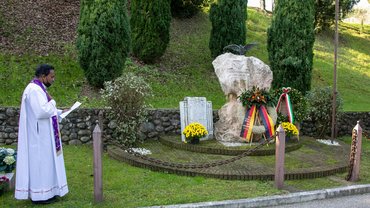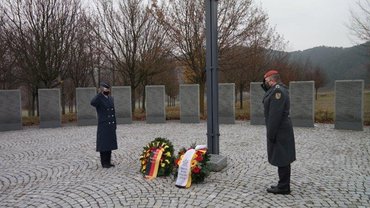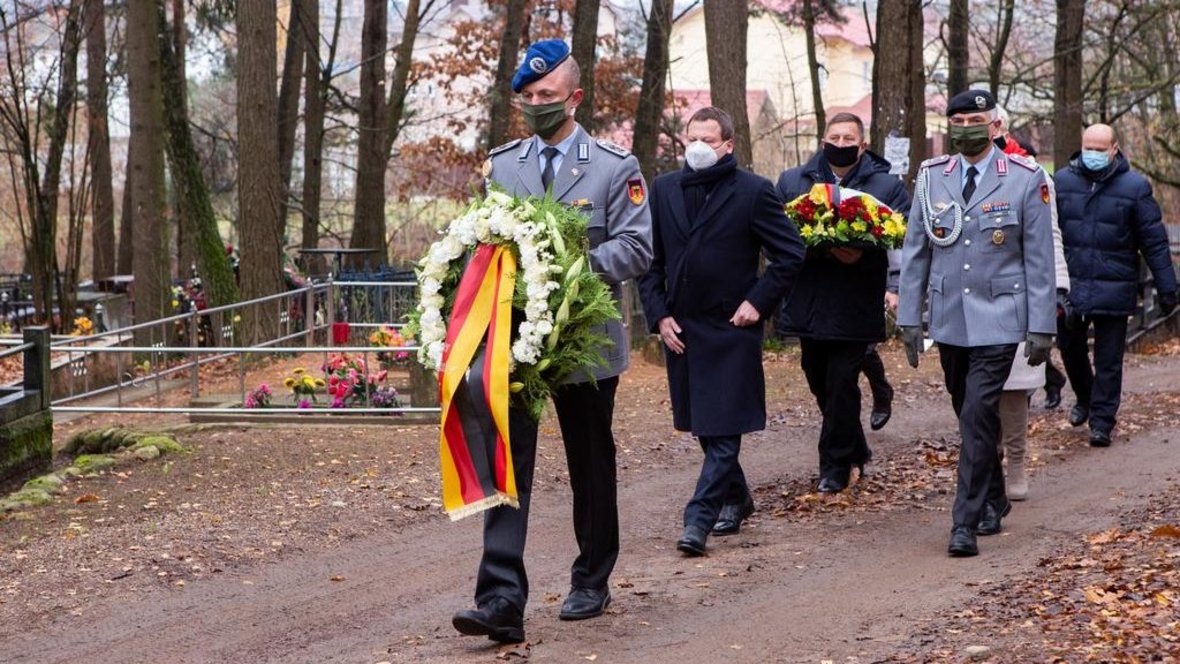
Remembrance at war graves sites worldwide – a roundup
National Day of Mourning (Volkstrauertag): from Japan to Brazil
From Japan to Brazil, from Russia to South Africa, the National Day of Mourning, on the penultimate Sunday in the church year, is an important occasion. In countless places all over the world, wreaths testify to living remembrance of the war dead – those of Germany and those of the other nations.
France – this nation of commemoration and remembrance, had to decide whether to restrict or cancel events.” These words written by Carole Novy, director of the Volksbund (German War Graves Commission) office in Metz, were of universal relevance on 15 November 2020. As many examples from all over the world demonstrate, this day forfeited none of its significance as a result.
To name France again as an example, in many places with a German military cemetery, remembering the dead is a matter of honour – as in the municipalities of Avranches-Mont d'Huisnes, Lesneven-Ploudaniel and Pornichet. Ambassador Hans Dieter Lucas laid a wreath at the German and French military cemeteries in Versailles. Special thanks go to the Volksbund staff, who laid wreaths not only for the Volksbund but also for the embassy and a number of consulates. This too is exemplary.
In many places throughout the world, German embassy or consular representatives and military attaché personnel remembered the war dead jointly with the Volksbund:
In Belgium, German ambassador Martin Kotthaus laid a wreath in Lommel at one of the largest German war grave sites in Western Europe – alongside the Volksbund representative for Belgium, Colonel-in-Chief Erik De Muynck, and Myriam Koonings, director of 'Huis over Grenzen' on behalf of the town of Lommel.
In Spain there was a commemorative church service with the laying of wreaths by the German embassy at the military cemetery Cuacos de Yuste in the city of Cáceres, where 26 German soldiers from the First and 154 from the Second World War are buried.
In Portugal, embassy representatives remembered the casualties of war in the capital Lisbon. And in Aljezur on the Algarve, a wreath was laid by a representative of the German Nato soldiers in Portugal and the honorary consul on behalf of the ambassador of the Federal Republic.
In Switzerland, wreaths were laid at Sihlfeld Cemetery in Zurich, where there is a monument to soldiers who fell in the wars. The remembrance ceremony was led by Michael Flügger, Germany’s new ambassador in Bern.

In Italy, commemorative events involving the smallest possible number of participants took place at Cassino and Pomezia and at Milis and Cagliari on Sardinia. Among those who took part at Cassino, for example, were Klemens Mömkes, permanent representative of the German ambassador, and Achim Hertgens, defence attaché.
In Greece, ambassador Dr. Ernst Reichel and embassy defence attaché Colonel (General Staff) Axel Pütz laid a joint wreath at the German military cemetery at Dionysos-Rapentosa near Athens.
Romania: A small but dignified event was organised jointly by the German embassy in Bucharest and the French and Bulgarian embassies at Bucharest’s Pro Patria and Bellu cemeteries.
In Albania, a commemorative event was held in the capital Tirana at which ambassador Peter Zingraf, Lieutenant Colonel (General Staff) Dirk Weber and Master Sergeant Marko Dinger of the military attaché’s office laid a wreath.
In Macedonia, German ambassador Anke Holstein remembered the casualties of war with French ambassador Cyrille Baumgartner in Skopje. Also participating were military personnel from both nations, who had travelled from Tirana.

Hungary:German ambassador Johannes Haindl, defence attaché Lieutenant Colonel (General Staff) Uwe Zvonar, S3 officer Lieutenant Elisabeth Kurz and office manager Company Sergeant Major Normen Fuchs took part in a remembrance ceremony in Budaörs near Budapest. A wreath was also laid by the Volksbund’s country representative in Hungary, Imre Kovács.
Ukraine: The diplomatic representatives of 15 nations (various EU countries, the USA, Japan, Azerbaijan) came together for a relatively large-scale event held in strict accordance with the Corona regulations. The Volksbund was also represented. The participants had been invited by Ambassador Feldhusen of Germany. Music was provided for the ceremony by a military orchestra.
Slovakia: The main remembrance ceremony took place at the German war graves site in Bratislava-Vrakuňa. German ambassador Barbara Wolf remembered the victims of war and violence in the company of representatives of the German embassy in Bratislava, the Association of Carpathian Germans and the Volksbund and various other guests including the former German ambassador Dr. Axel Hartmann. For the German soldiers who fell in the Bratislava area, a collective cemetery was established at Ružinov Cemetery in the Bratislava-Vrakuňa district. Around a thousand German soldiers who perished in the Second World War are buried there.
Czech Republic: Wreaths were also laid at the Tomb of the Unknown Soldier at the district cemetery in Motol – not one of the Volksbund’s war grave sites – in Prague.
Russian Federation: In keeping with tradition, the wreath laid at the Ljublino prisoner of war cemetery on the outskirts of the capital was carried by students of the German school in Moscow. The address was given by permanent representative Beate Grzeski. In addition to German military attaché personnel under the command of Brigadier General Horn, the defence attachés of other Second World War combatant nations were also represented. 486 German soldiers are buried in individual graves in this cemetery, which was consecrated in the mid-1990s.
Belarus: The laying of wreaths at the war grave site at Tarasovo, near Minsk, brought together the German ambassador Manfred Huterer, defence attaché Andreas Leibner and representatives of the Volksbund and Belarus’s foreign ministry. They commemorated the 1,098 German Second World War prisoners of war who are buried there, but also 14 Belarussian resistance fighters and soldiers who opposed the occupying forces and paid for it with their lives.
Latvia: At the collective cemetery of Beberbeki, 20 kilometres from Riga, the fallen of the Second World War were remembered by David Bartels, chargé d’affaires of the German embassy in Riga, Baiba Blodniece parliamentary secretary of the Latvian Defence Ministry and Janis Racins, the Volksbund representative in Latvia. New ambassador Christian Heldt was in attendance as a private individual – he has been in office since 17 November.
Lithuania: Wreaths were laid at the cemetery in Vingis Park in the capital Vilnius by the diplomatic corps, including ambassadors and military attachés. The USA, France, Great Britain, Ukraine and Canada were represented. Lithuania’s deputy defence minister also took part, as did the cultural heritage service and a guard of honour, with trumpeters, of the Lithuanian army. The event was organised by the German defence attaché Konstantin Bellini.
Finland: German-British friendship was in evidence in Helsinki when, following a service in the German church, the British ambassador Tom Dodd took part in a commemorative ceremony at the monument to soldiers who had fallen in 1918.
Sweden: Following services in the British and German churches in Gothenburg, the focus of events was a remembrance ceremony with the laying of wreaths on the graves of fallen British and German soldiers.
Great Britain: Germany participated in a threefold commemoration on Britain’s Remembrance Day (11 November): Defence attaché Michael Oberneyer laid a wreath at a commemorative event at the military cemetery at Brookwood which is organised every year by military attaché personnel in London. At Cannock Chase, the place of burial for almost 5,000 German war dead of both world wars, German air attaché Stephan Breidenbach laid a wreath. And naval attaché Mathias Schmidt paid respect to the fallen in a ceremony at the military cemetery in Botley, near Oxford.
In South Africa, military attaché personal based in Pretoria took part in commemorative events in Pretoria and Cape Town. In Cape Town the participants included consul general Matthias Hansen, while in Pretoria the German ambassador Martin Schäfer took part. The war dead were also remembered by representatives of the SA Police Counter Insurgency Unit Veterans League.
In Tunisia too, ambassador Peter Prügel made Germany’s National Day of Mourning a focus of attention with a commemorative event in the town of Bordj Cedria.
Egypt:Even the laying of wreaths at El Alamein (EGY) was severely reduced in scale. Among those in attendance were German ambassador Dr. Cyrill Nunn, British ambassador Sir Geoffrey Adams, British defence attaché Steve Deacon and German defence attaché Jan Otte.
Israel: A wreath-laying ceremony took place in much restricted circumstances at the war graves site in Nazareth. The Volksbund thanked the military attaché personnel around Tim Hullmann (deputy military attaché) as well as ambassador Susanne Marianne Wasum-Rainer for their involvement.
Turkey: The German embassy in Ankara marked the National Day of Mourning with a ceremony attended by 50 guests at the military ceremony in the grounds of the summer residence of ambassador Jürgen Schulz in the Tarabya neighbourhood of Istanbul. Among those who took part were representatives of the Turkish armed forces, the mayor of Sariyer and the deputy mayor of Istanbul.
Iraq: The wreath-laying at the German military cemetery in Baghdad took place without ceremony. Bulletproof vests were worn. Wreaths were laid by ambassador Dr. Ole Diehl and defence attaché Christoph Schumann. Given the conditions in Iraq, the German military cemetery is in an excellent state and is maintained by a family. The inscriptions on the graves, some of which are over a hundred years old, are all legible.
Indonesia: In Jakarta too, the ceremony at the German war graves site was limited to a silent laying of wreaths.
Japan: Defence attaché Colonel (General Staff) Karsten Kiesewetter laid wreaths in Bando, Narashino and Oita in remembrance of soldiers who perished in Japanese prisoner of war camps after the Battle of Tsingtao in 1914. The ceremony in Oita was a first. There was intensive reporting of it in the press and on television – not least because Kiesewetter’s great-great-uncle, Julius Paul Kiesewetter, is one of those buried there. And at the cemetery in Yokohama, the defence attaché also remembered the German soldiers killed when a ship exploded in 1942.
USA: The army attaché from the military attaché’s office in Washington laid a wreath at Arlington National Cemetery. At the grave of Staff Sergeant Anton Hilberath, Colonel (General Staff) Stephan Lissinna and Master Sergeant Ingo Schulz remembered the 830 or more German Second World War prisoners of war who died in the United States. Hilberath is the only German prisoner of war whose grave is located at Arlington National Cemetery.
Brazil: The only embassy in Brasília with its own war memorial is Canada's. The representative of the German embassy, Marc Bogdahn, accompanied by military attaché personnel, laid a wreath at the monument in the embassy grounds. Numerous representatives of other Commonwealth embassies and friendly nations as well as those of Brazil itself remembered the dead and the suffering of countless wars at this ceremony.
Argentina: The German embassy has reported that the German cemetery in the Chacarita district of Buenos Aires was the scene of a small-scale memorial ceremony in Argentina.
Australia: On behalf of the German ambassador, the honorary consul from Melbourne, Michael Pearce, laid a wreath in Tatura.
